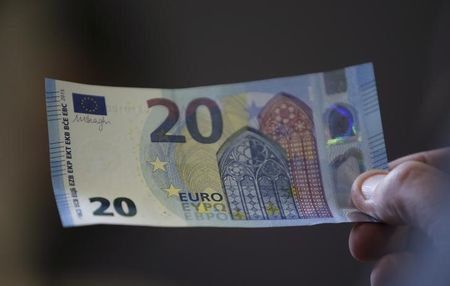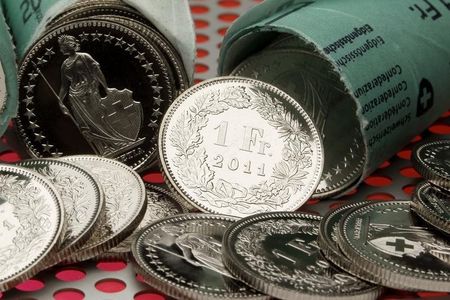Month: May 2024
Dollar price forecast: JPMorgan shares their 2024 outlook
Post Content
UBS sees upside potential for NOK/SEK
Post Content
UBS lowers EUR/CHF target to 0.96 amid expected ECB rate cuts
Post Content
UBS sees limited EUR/USD breakout potential above 1.10 by 2025
Post Content
UBS sees Swiss franc on backfoot, predicts Fed rate cuts
Post Content
BlackRock’s $20 Billion IBIT Becomes The World’s Largest Bitcoin ETF
BlackRock’s spot bitcoin exchange-traded fund (ETF), iShares Bitcoin Trust (IBIT), has overtaken Grayscale’s Bitcoin Trust (GBTC) as the world’s largest Bitcoin ETF.
As of May 28, IBIT holds over $20 billion in assets with 288,670 Bitcoin in its trust. This surpasses GBTC’s $19.7 billion in assets and 287,450 bitcoin holdings.
JUST IN: BlackRock’s spot #Bitcoin ETF $IBIT passes GBTC to become the largest Bitcoin ETF in the world. pic.twitter.com/b9hgfZLmY7
— Bitcoin Magazine (@BitcoinMagazine) May 29, 2024
The flipping of fortunes comes just months after both ETFs launched on the same day in January amid a wave of SEC-approved bitcoin ETFs hitting the market. While GBTC bled funds, IBIT saw steady inflows that now make it the dominant player.
Grayscale has witnessed accelerating outflows as investors pivot to BlackRock’s ETF and other spot bitcoin products due to its high fees. On Tuesday alone, GBTC saw a $105 million exit while IBIT gained over $100 million.
The rise of IBIT also beats out the $11 billion Fidelity Bitcoin ETF for the top spot. Its rapid ascent to over $20 billion in assets also makes it one of the fastest-growing ETFs ever.
BlackRock is adding IBIT to its Strategic Income and Strategic Global Bond funds this week, further validating institutional demand. The asset manager now holds shares of its Bitcoin ETF across several major funds.
Image Subtext: Click the image to learn more.
With Bitcoin adoption going mainstream, asset managers like BlackRock are positioning themselves to meet surging institutional demand. The SEC’s approval of bitcoin ETFs has provided an easy on-ramp for banks, hedge funds and more.
BlackRock’s rise to become the issuer of the largest Bitcoin ETF signals the growing acceptance of Bitcoin by legacy finance. Old-guard firms increasingly see the value in offering clients access to digital asset exposure.
Dollar edges higher on higher yields; euro awaits inflation data
Post Content
Asia FX weakens as rate fears boost dollar; yuan at weakest in 6 months
Post Content
Bitcoin Privacy On Trial: Samourai Developers’ First Court Hearing Recap
Today, in the Southern District of New York, was the first hearing in the US Department of Justice’s (DoJ) case against Samourai Wallet developers Keonne Rodriguez and William Lonergan Hill.
I attended the first hearing for the #Samourai Wallet case earlier today on behalf of @BitcoinMagazine and briefly spoke with one of the defendants, Keonne Rodriguez, after the hearing.
Here’s a recap of what I learned: pic.twitter.com/QZN4Ape0CZ
— Frank Corva (@frankcorva) May 28, 2024
The two developers were arrested in late April and charged with money laundering and operating an unlicensed money transmitting business.
Only Rodriguez and his attorney, Michael Krause, were present in the courtroom today, though, as Hill is still in Portugal and has yet to respond to an extradition request from the US government.
The prosecution stated that it is nearly set to engage in discovery (sharing the evidence that it plans to use for the trial with the defendants) and that it is prepared for the trial whether both Hill and Rodriguez are present for it or not.
Samourai Wallet developer Keonne Rodriguez leaving the courthouse in downtown Manhattan after his hearing on May 28, 2024.
“Substantial Discovery”
The prosecution also stated that it has yet to extract all of the data from the electronic devices it has confiscated from Rodriguez, but that it will provide “substantial discovery” based on the information it has obtained thus far.
And it shared that it is still waiting on Rodriguez to turn over a 2 terabyte hard drive that the defendant still has in his possession.
No details were provided as to what data might be on the hard drive.
A Letter From Two Senators
Rodriguez’s attorney stated that he plans to file a motion to dismiss the indictment of his client and his client’s partner at Samourai, citing a letter that US Senators Cynthia Lummis (R-WY) and Ron Wyden (D-OR) sent to Attorney General Merrick Garland in which the two politicians argued non-custodial crypto software can’t be a money transmitting service.
“We write to express our grave concerns regarding the U.S. Department of Justice’s (DOJ) recent policy arguments that dramatically expand the scope of the Federal prohibition on operating an unlicensed money transmitting business,” begins the letter.
“The DOJ’s unprecedented interpretation of this statute in the context of non-custodial crypto asset software services contradicts the clear intent of Congress and the authoritative guidance of the Department of the Treasury’s Financial Crimes Enforcement Network (FinCEN). This interpretation threatens to criminalize Americans offering non-custodial crypto asset software services,” Senators Lummis and Wyden added.
The letter also acknowledges that “non-custodial crypto service providers cannot be classified as money transmitter businesses because users of such services retain sole possession and control of their crypto assets.”
Moving Forward
The judge announced that Rodriguez would remain under house arrest and that the next hearing for the case would take place on September 4, 2024 at 11:30 AM EST.
Those interested in donating to the legal defense fund for the Samourai developers can do so via this fundraiser set up by the Bitcoin Policy Institute (BPI).
Dollar rebounds as yields rise, consumer confidence improves
Post Content








